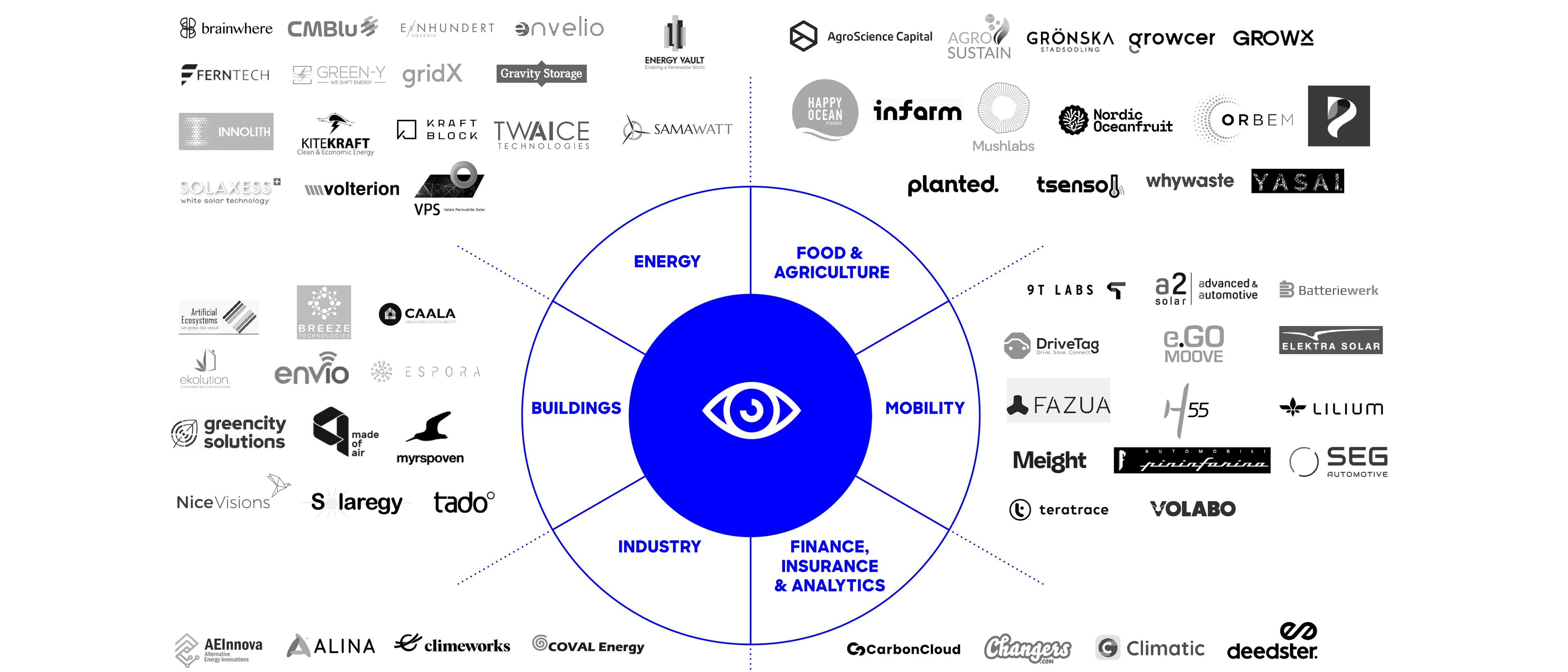 © United States Geological Survey
© United States Geological SurveyA global need for innovations that tackle climate change - and start-ups’ answers to it: Take a look at young companies from Europe, with a focus on the DACH region (Germany, Austria, Switzerland) in our Climate Tech Start-up Landscape, and find out how they are changing traditionally polluting industries for the better.
In the field of ‘climate technologies’, we’ have seen start-up innovations take off in the past few years. The need for solutions is clear: greenhouse gas emissions are still increasing and our environment is threatened by climate change. To adhere to the commitment of keeping global warming below 2ºC (ideally 1.5ºC), clear political action as well as future-proof innovations are needed.
Sustainable Change in Industry Sectors
The UnternehmerTUM accelerator TechFounders put together the Climate Tech Start-up Landscape below. The team summarized solutions in the five areas that contribute most to climate change. As behavioral change is a critical factor in minimizing emissions, it was added as well. The article features these six sections:
- energy
- food, agriculture, and forestry
- manufacturing
- transportation
- built environment
- evaluation and behavioral change

Landscape presenting start-ups in climate tech, divided into different sectors
1. Energy
Energy production contributes most to carbon emissions worldwide, with a share of 25% according to the Intergovernmental Panel on Climate Change (IPCC). Next to their direct environmental impact, renewable energy sources make it possible to reduce carbon emission in other fields as well. There are start-ups in different sectors that come up with more appealing, cost-effective, and efficient ways of power production: Solaxess for example, who manufacture solar panels without visible cells.
Ensuring that energy can be stored and that there’ is a grid supply infrastructure is an even bigger hurdle so far. Several young companies are developing solutions so that even without direct sunlight and wind, clean energy is available. The start-up Kraftblock from Germany stores energy thermally - the perks are a high capacity (1.2MWh/m3) and the ability to convert heat from industrial processes into power.
2. Food, Agriculture, and Forestry
Providing food for a rising number of people on earth while ensuring emissions are not rising at the same rate is the central task in this sector. Solutions are about making the food-producing industry more efficient, meaning less waste and product alternatives that are low in carbon emissions.
The start-up Whywaste from Sweden created a software that keeps an eye on expiration dates in grocery stores, for example - leading to a 40% reduction in food waste. Many other companies came up with a Plan B for meat and dairy in supermarket shelves - resulting in less methane being emitted (as livestock accounts for 4% of methane emissions). To name one, Mushlabs, founded in 2018, turns mushroom roots into a substitute for meat.
Rethinking how land is being used for farming is another important approach to sustainable agriculture. Various young companies are addressing this with vertical farming solutions, for example Swiss start-up Growcer and the Swedish team Grönska.
3. Manufacturing
Manufacturing processes issue a variety of greenhouse gases. Handling raw materials - steel, concrete, cement, paper, and others - as well as components and items more sustainably will redefine the industry in the upcoming years.
The construction industry is moving towards a circular economy model with a great number of innovations. Two Swiss start-ups are setting an example: Neustarck up-cycles used concrete which binds CO2 into calcite and Oxara creates sustainable concrete without hazardous substances. The Oxara formula uses excavation material, resulting in 90% less carbon dioxide emissions. In other areas such as the production of steel, there’s still a lack of sustainable options.
Since CO2 heats up the earth’s atmosphere, capturing the gas is a big lever in slowing down the greenhouse effect and has turned into a field of interest in research. The Swiss company Climeworks is on top of the game here and received USD 125 million in capital. Using renewable energy, they developed a stackable technology that collects carbon which can be recycled or repurposed in manufacturing - 90% of it being permanently taken out of the atmosphere.
4. Transportation
The transportation sector is number four among the biggest carbon emitters. The IPCC accounts it for 14% of emissions which largely stem from road transportation as well as the fossil fuel-powered travel and freight sector. Transportation emissions have increased the fastest and are predicted to rise more.
Across the mobility sector, companies are working to implement more fuel-efficient solutions, innovative materials, and new concepts for how we travel from A to B. Some start-ups are trailblazing here: Lilium from Munich is dedicated to providing a new air mobility service with their electrically powered passenger jet. Team e.GO MOOVE from Germany is building smart electric vehicles that are driving autonomously.
Numerous other companies contribute to a more efficient and lighter e-mobility: Fazua with electric bikes and Volabo with electric boat motors.
5. Built Environment
As the population grows, the built environment sector is predicted to be growing, too. With its necessary building materials and the need to power and heat our living and working spaces, it accounts for a big share in greenhouse gas emissions. Start-ups do their part to lessen its environmental impact, for example with carbon-negative ways of constructing facades and insulation. Made of Air was founded in 2016 and provides a material that consists of 90% carbon from the atmosphere. Artificial Ecosystems from Germany developed wall panelings that are absorbing CO2.
At the same time, there’s a need to increase efficiency and emit fewer greenhouse gases wherever possible - a mission that start-ups like Envio and Myrsproven have taken on by using energy in a smarter way. The start-up tadoº is providing an innovative heating solution.
6. Behavioral Change and Evaluation
Environmental action is a necessary collective effort. A number of start-ups provide solutions that help us be more aware of our environmental footprint, whether as individuals or organizations. Dedicated tracking software and mobile apps monitor carbon output, give incentives for better actions while consuming or traveling, and share best practices and emission offsetting options for companies.
Changers from Berlin launched an app that motivates users to act consciously by providing prizes. Making it possible for companies to track and offset their carbon emissions, other start-ups like Plan A and Klima Metrix are part of the change, too.
Conclusion
In order to adhere to the Paris Agreement, the European Union needs to take massive action to decrease its carbon emissions by 40%. Backing young companies that tackle environmental challenges with innovative tech is the way to go. With governments, investors, and corporations awakening to their necessity, we’re convinced that climate-focused innovations from start-ups will be gaining more momentum in the upcoming years.
Get in Touch
- Do you want to work on solutions with start-ups or are you looking for a more detailed line-up of climate-tech start-ups? Then please write an e-mail to:
contact@techfounders.com - If you want to foster innovation as a company, please get in touch with:
Christian Mohr
Managing Director and Chief Customer Officer UnternehmerTUM
christian.mohr@unternehmertum.de - As a start-up that wants to be listed on this landscape, your contact is:
Andy Hurt
Venture Associate TechFounders
andy@techfounders.com
Authors: Miki Yokoyama, Florian Ebel, Marta Tarruella, and Brian Diaz
























